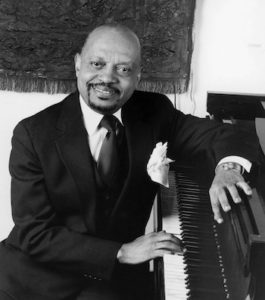
Donald Shirley
*Donald Shirley was born on this date in 1927. He was a Black classical and jazz pianist and composer.
Donald Walbridge Shirley was born in Pensacola, Florida, to Jamaican immigrant parents Stella Gertrude, a teacher, and Edwin S. Shirley, an Episcopal priest. Young Shirley started learning the piano when he was two years old. He briefly enrolled at Virginia State University and Prairie View College.
In 1945, at the age of 18, Shirley performed the Tchaikovsky B-flat minor concerto with the Boston Pops. A year later, he performed one of his own compositions with the London Philharmonic Orchestra. In 1949, Shirley received an invitation from the Haitian government to play at the Exposition Internationale du Bi-Centenaire de Port-au-Prince, followed by a request from President Estimé and Archbishop Le Goise for a repeat performance the next week. On December 23, 1952, Shirley married Jean C. Hill in Cook County, Illinois; they later divorced.
Discouraged by the lack of opportunities for classical black musicians, Shirley abandoned the piano as a career while young. He studied psychology at the University of Chicago and began work in Chicago as a psychologist. There, he returned to music. He was given the grant to study the relationship between music and juvenile crime, which had broken out in the postwar era of the early 1950s. Playing in a small club, he experimented with sound to determine how the audience responded. The audience was unaware of his experiments and that students had been planted to gauge their reactions.
He also studied with Conrad Bernier and Thaddeus Jones at the Catholic University of America in Washington, D.C., where he received his bachelor’s degree in music in 1953. At Arthur Fiedler's invitation, Shirley again appeared with the Boston Pops in Chicago in June 1954. In 1955, he performed with the NBC Symphony at the premiere of Ellington's Piano Concerto at Carnegie Hall. He also appeared on TV on Arthur Godfrey and His Friends. During the 1950s and 1960s, Shirley recorded many albums for Cadence Records, experimenting with jazz with a classical influence. In 1961, his single "Water Boy" reached No. 40 on the Billboard Hot 100 and stayed on the chart for 14 weeks. He performed in New York City at Basin Street East, where Duke Ellington heard him, and they started a friendship.
Also, during the 1960s, Shirley went on several concert tours, some in Southern states, believing that he could change some minds with the intersectionality of his performances. He hired Italian New York nightclub bouncer Tony "Lip" Vallelonga as his driver and bodyguard. Their story is dramatized in the 2018 film Green Book, the name of a travel guide for black motorists in the segregated United States. Despite some early friction with their differing personalities, the two became good friends in the fictionalized account.
In late 1968, Shirley performed the Tchaikovsky concerto with the Detroit Symphony. He also worked with the Chicago Symphony and the National Symphony Orchestra. He wrote symphonies for the New York Philharmonic and Philadelphia Orchestra. He played as a soloist with the orchestra at Milan's La Scala opera house in a program dedicated to George Gershwin's music. He recorded many albums for Cadence during the 1950s and 1960s, experimenting with jazz with a classical influence. He wrote organ symphonies, piano concerti, a cello concerto, three string quartets, a one-act opera, works for organ, piano, and violin, a symphonic tone poem based on the novel Finnegans Wake by James Joyce, and a set of "Variations" on the legend of Orpheus in the Underworld.
Known as “Dr. Shirley,” he had two honorary doctorates. He wrote organ symphonies, piano concerti, a cello concerto, three string quartets, a one-act opera, works for organ, piano, and violin, a symphonic tone poem based on the novel Finnegans Wake by James Joyce, and a set of "Variations" on the legend of Orpheus in the Underworld. Forced to limit his performance after developing tendinitis in his right hand in the early 1970s, he disappeared from the public eye by the end of the decade.
A 1982 Times article reported that the musician was attempting a comeback and playing regularly alongside his longtime partners in Manhattan's Greenwich Village. Shirley resurfaced with the occasional performance in the early 2000s. With help from a devoted student, he put together a new album, Home with Donald Shirley, on his Walbridge Music label in 2001. Donald Shirley died of heart disease on April 6, 2013, at the age of 86.